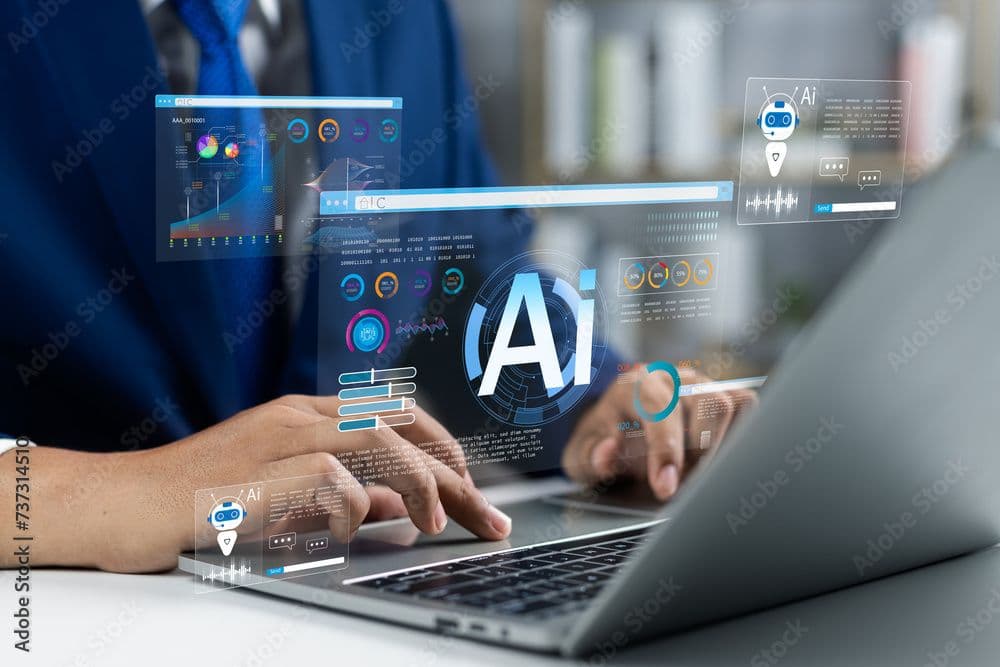AI in Education

AI in Education: Personalized Learning for the Next Generation
Artificial Intelligence (AI) has made significant strides in recent years, not just in industries like healthcare, finance, and manufacturing, but also in the realm of education. AI is rapidly transforming how students learn, how teachers teach, and how educational content is created and delivered. One of the most profound impacts of AI in education is its ability to offer personalized learning experiences. By analyzing individual students’ learning styles, progress, strengths, and weaknesses, AI can adapt the educational experience to meet the unique needs of each learner. This approach promises to create more effective, engaging, and inclusive educational environments, catering to students of all abilities and backgrounds. In this blog, we will explore how AI is reshaping education, its role in personalized learning, and the future potential of AI in creating a more efficient and student-centered educational system.
One of the main benefits of AI in education is its ability to customize learning paths for each student. Traditionally, education has been a one-size-fits-all approach, where teachers deliver the same lessons to a classroom full of students. While this method works for some students, others may struggle to keep up or find the material too easy, leading to disengagement. AI-powered learning systems can analyze vast amounts of data to understand the unique learning preferences, behaviors, and capabilities of each student. For example, adaptive learning platforms powered by AI can modify the difficulty level of lessons based on a student’s performance. If a student excels in a particular subject, the system will provide more challenging material to keep them engaged. On the other hand, if a student is struggling, the system will offer additional resources, such as practice problems, explanations, or videos, to help them master the topic. This personalized approach ensures that every student receives the support they need to succeed at their own pace, promoting a deeper understanding of the material and fostering a love for learning.
AI also plays a critical role in providing immediate feedback and assessments to both students and teachers. Traditional assessment methods, such as quizzes and tests, often provide feedback after a delay, leaving students with limited opportunities to improve before the next test. AI-driven platforms can offer real-time feedback, allowing students to understand their mistakes instantly and make necessary adjustments to their learning strategies. For instance, when a student answers a question incorrectly, AI can immediately offer hints or explanations, helping the student to correct their mistake before it becomes a larger gap in their understanding. This continuous feedback loop enables students to learn more efficiently and encourages self-directed learning. For teachers, AI can help identify trends and patterns in student performance, providing insights into which students need additional support, which areas of the curriculum may require further emphasis, and how to adjust teaching strategies for better outcomes. This data-driven approach not only improves student learning outcomes but also makes teachers’ work more efficient and effective.
In addition to personalized learning, AI is revolutionizing the way educational content is created and delivered. AI tools can help educators design more engaging and interactive lessons by incorporating multimedia elements such as videos, animations, and simulations. These tools can also adapt content in real-time based on student responses, ensuring that the material remains engaging and relevant. For example, AI-powered platforms can create interactive quizzes, simulations, and virtual environments that allow students to explore subjects in a hands-on, immersive way. In subjects like science and engineering, virtual labs powered by AI can simulate experiments and processes that might not be feasible in a traditional classroom setting. Moreover, AI can be used to create intelligent tutoring systems, where students can receive one-on-one support and guidance in subjects they are struggling with, without requiring additional teachers or tutors. This accessibility makes learning more interactive, dynamic, and tailored to the needs of each student.
The future of AI in education is promising, with continuous advancements expected to further enhance personalized learning and improve educational outcomes on a global scale. As AI technology becomes more sophisticated, its applications in education will likely expand to include more complex tasks such as emotion recognition and learning style analysis. For example, AI systems may be able to detect when students are feeling frustrated, bored, or disengaged based on their facial expressions or patterns of interaction, and adjust the content or learning environment to improve their experience. Furthermore, AI has the potential to bridge educational gaps in underserved areas by providing access to high-quality learning materials and instruction remotely. In countries or regions where access to qualified teachers is limited, AI-powered tools can offer students the opportunity to learn at their own pace, even in areas with few educational resources. As AI continues to evolve, it will play a central role in making education more inclusive, accessible, and personalized, helping to shape the next generation of learners for an increasingly complex and digital world.
In conclusion, AI in education holds immense potential to revolutionize how we teach, learn, and interact with educational content. By personalizing learning experiences, providing real-time feedback, and enabling more engaging and interactive lessons, AI is making education more efficient, effective, and accessible than ever before. The ability to tailor learning to each student’s needs ensures that every learner can achieve their full potential, regardless of their background or abilities. As AI continues to evolve, its impact on education will only grow, making the educational experience more personalized, inclusive, and effective. The future of education is one where AI plays a central role in fostering creativity, critical thinking, and lifelong learning, preparing students for success in an ever-changing world.
,